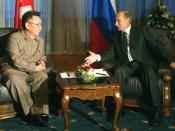The time has come for the United States to take direct negotiations with North Korea to the next level. The problem of a very real and present danger of a North Korean regime collapse, combined with North Korea's possession of nuclear weapons have merged together to form an unavoidable crisis for the United States. The threat of a regime collapse in North Korea poses a very serious problem for Eastern Asia, the United States, and the rest of the world. We cannot chance loose nuclear weapons in the case of regime collapse. The problem is not a nuclear North Korea, but a nuclear North Korean collapse. The United States must eliminate North Korea's nuclear weapons by ensuring its regime stability and sustainability through negotiation and intense economic incentive by the United States, as well as the other main Eastern Asia countries, in exchange for Kim Jong Il giving up his nuclear weapons and nuclear program.
Past History:Although drastic North Korean nuclear action has been avoided in the past, it has been impossible to trust North Korea in the past thirty years, due to their repeated ignorance of several treaties.
A look at past North Korean action helps to understand the danger of our current situation. In 1985, the first Bush Administration realized the potential nuclear danger of North Korea and persuaded the Soviet Union to compel North Korea to join the Non-Proliferation Treaty (Perry, 1). Later, in 1990, the United States witnessed the first nuclear crisis after international inspectors declared North Korea in violation of the Non-Proliferation Treaty, as North Korea ejected inspectors and began reprocessing fuel rods to extract plutonium (Lind, Lecture). This would have given North Korea enough plutonium for five or six more nuclear bombs, if they had not been stopped (Perry, 1). This fact alarmed the...


